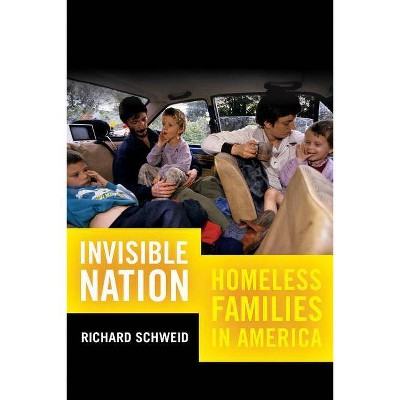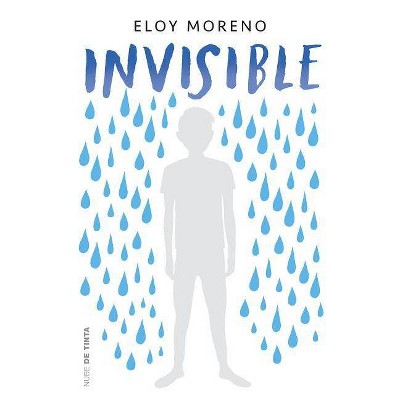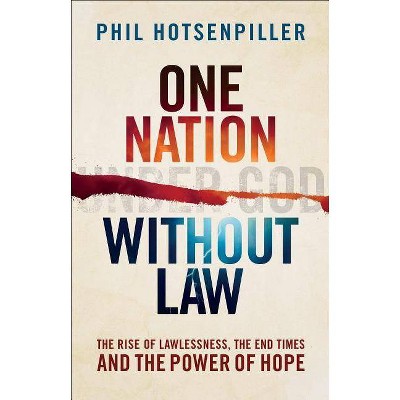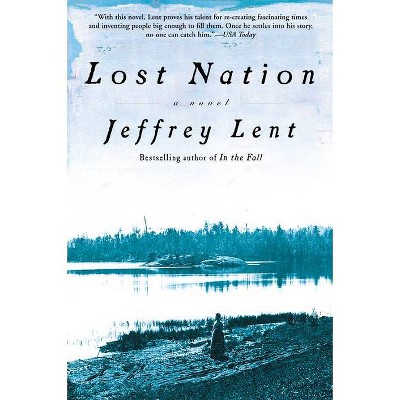Invisible Nation - by Richard Schweid (Paperback)

Similar Products
Products of same category from the store
AllProduct info
<p/><br></br><p><b> About the Book </b></p></br></br> "Every year, more than 2.5 million children are left homeless in the United States and the number of such families continues to rise annually. In every state, children are living in small quarters packed in with relatives-- in cars, in motel rooms, or in emergency shelters. In this vividly-written narrative, experienced journalist Richard Schweid takes us on a spirited journey through this "invisible nation,' giving us front-row dispatches of suffering families on the edge. Based on in-depth reporting from five major cities, Invisible Nation looks backward at the historical context of family homelessness as well as forward at what needs to be done to alleviate this widespread, although often hidden, poverty. Invisible Nation is a riveting must-read for everyone who cares about inequality, poverty and family life"--Provided by publishe<p/><br></br><p><b> Book Synopsis </b></p></br></br>"By the second or third day that you're homeless, in the car with all your clothes, your pots and pans, everything, having to wash yourself in a public rest room, you logically start to feel dirty. You prefer to use the drive-through [at fast-food restaurants] where no one will see you. You begin to hide your family."--<i>Invisible Nation</i><i> </i> <p>More than 2.5 million children are homeless in the United States every year. In every state, children are living packed in with relatives, or in cars, or motel rooms, or emergency shelters, the only constant being too many people in too little space. In a vividly-written narrative, experienced journalist Richard Schweid takes us on a spirited journey through this "invisible nation," giving us front-row dispatches. Based on in-depth reporting from five major cities, <i>Invisible Nation</i> looks backward at the historical context of family homelessness, as well as forward at what needs to be done to alleviate this widespread, although often hidden, poverty. <i>Invisible Nation</i> is a riveting must-read for anyone who wants to know what is happening to the millions of families living at the bottom of the economy. </p><br /><p/><br></br><p><b> From the Back Cover </b></p></br></br>"Richard Schweid casts an intensely thorough and compassionate eye on the plight of homeless families in America. In a nation pledging itself to liberty and justice for all, why can we not add to that pledge decent housing for those struggling to live among us in dignity?"--Emmylou Harris <p/> "Richard Schweid provides a narrative for the quick fall into homelessness for families who may as well be living next door. I was shocked to read about a situation in my own city, Portland, Oregon, which was a problem I noticed, but never fully understood. <i>Invisible Nation </i>is a call to action against an urgent problem."--Christopher Ryan, author of <i>Sex at Dawn: How We Mate, Why We Stray, and What It Means for Modern Relationships</i> <p/> "<i>Invisible Nation</i> is a must-read for policy makers, students of sociology, and anyone else concerned about the widening wage gap in our country."--Dale Maharidge, Pulitzer Prize-winner and author of <i>Someplace Like America: Tales from the New Great Depression</i> <p/> "Richard Schweid's account of the damage done to homeless children in our society is not only heartrending but also amounts to a call to action. Read this book and do something about it."--Madison Smartt Bell, author of <i>Zig Zag Wanderer: Stories from Here, Stories from There</i> <p/> "A brilliant and passionate book that shines a bright light on America's darkest shame."--Allen Frances, chair of the DSM-IV Task Force and of the Department of Psychiatry at Duke University School of Medicine<p/><br></br><p><b> Review Quotes </b></p></br></br><br>"Invisible Nation exemplifies the relevance of history to social science research and policymaking and would be most useful in social welfare history courses aimed at students of social work, policy, and other practical disciplines."-- "Journal of Children and Poverty"<br><br>"Remarkable and disconcerting. . . . This exceptional work of journalism chronicles the lives of America's homeless families. . . . Schweid traveled through a nation that privileged Americans generally try to avoid and deny. These more fortunate Americans are embarrassed, indifferent and sometimes actively hostile to the desperate plight of their hidden neighbors. Schweid's book is a compelling account of his findings."-- "Truthdig" (10/28/2016 12:00:00 AM)<br><br>"Schweid creates some vivid portraits of day-to-day struggles . . . . You close the book wondering where those millions of homeless children will sleep tonight."-- "WBUR, The ARTery" (10/24/2016 12:00:00 AM)<br><p/><br></br><p><b> About the Author </b></p></br></br><b>Richard Schweid</b> is a journalist and documentary reporter. He is the author of nine nonfiction books, including <i>C</i><i><i>he's</i> Chevrolet</i>, <i>Fidel's Oldsmobile: On the Road in Cuba</i>, <i>Hot Peppers: The Story of Cajuns and Capsicum</i>, <i>Consider the Eel</i><i>: A Natural and Gastronomic History, </i>and<i> The Cockroach Papers: A Compendium of History and Lore</i>. He has also produced or reported more than two dozen documentaries for Catalonian public television, including the Oscar-nominated <i>Balseros</i>.
Price History
Price Archive shows prices from various stores, lets you see history and find the cheapest. There is no actual sale on the website. For all support, inquiry and suggestion messagescommunication@pricearchive.us




















